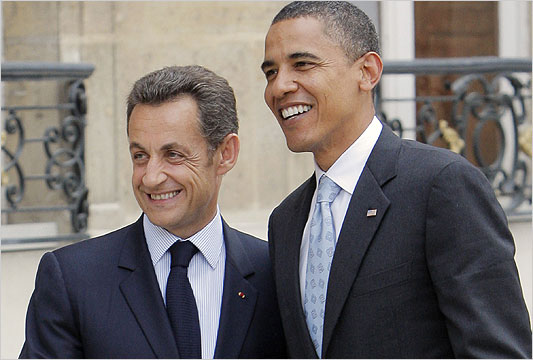
President Obama will join other G8 leaders today at the posh, French seaside resort of Deauville. On the agenda: proposed global regulations for the Internet, post-tsunami Japan, and military escapades in North Africa. Bizarrely absent from the top priorities listed by hosting head of state Nicolas Sarkozy is the most urgent issue of all: the need to rein in massive government over-spending and debt.
One needn’t travel to France to get a clear view of this problem. Here in the US, for example, federal revenues will top $2 trillion this year, but federal spending will approach double that amount. Such reckless spending has set the stage for a battle royal between Democrats and Republicans over raising the national-debt ceiling.
House Speaker John Boehner (R) of Ohio has correctly warned that increasing the debt ceiling without a firm commitment to slash spending would signal to investors that America still is not serious about kicking its spending addiction.
Meanwhile international credit rating agencies are threatening to do the US Federal Reserve’s job: taking the punch bowl off the table and telling people the party is over. America’s vaunted “Triple AAA” credit rating is no longer a given in global finance. If the US loses it, federal borrowing – now more than 40 cents of every dollar spent – will become much more costly.
It all provides a rather tumultuous backdrop for Mr. Obama’s trip to the G8 Summit. But he’s not the only participant facing a bumpy ride.
Europe’s day of reckoning
Europe also faces its day of reckoning after decades of overspending and overpromising. The Eurozone, as currently fashioned, appears to be on the verge of collapse. This helps explain the continental frenzy over the arrest of former IMF Chief and French presidential hopeful Dominique Strauss-Kahn. Europeans had been counting on him to funnel yet more IMF billions to Euro-deluded deadbeats like Greece and Portugal.
Mr. Sarkozy and the rest of the European leaders at the G8 have some explaining to do: If they won’t offer a plan to right the world economy, they should at least engage in an honest evaluation of the policies that have led so many countries to the brink of financial ruin.
Unfortunately, their attention will be elsewhere. Internet regulation, for one thing. Sarkozy calls it a “moral imperative” needed to “correct the excesses and abuses that arise from the total absence of rules.”
Internet censorship harms economies, freedom
Certainly, improving information infrastructure, technology, and access is integral to the development of modern economies. But letting governments control or even censor information is counterproductive.
Unfortunately, Sarkozy’s G8 proposal toes the statist line. He wants governments to intervene in cyberspace markets with intrusive regulation and taxes that could limit consumer choices and seriously distort both pricing and investment decisions.
A micromanaging G8 also could threaten press freedom. New media Internet outlets can be invaluable in exposing political corruption and guarding against bribery, extortion, nepotism, cronyism, patronage, embezzlement, and graft. Yet disturbing acts of censorship, attacks on press freedom, and denials of Internet service are on the rise. The World Bank reports that bloggers in Burma, Iran, Syria, Cuba, Saudi Arabia, Vietnam, Tunisia, China, Turkmenistan, and Egypt are harassed and sometimes imprisoned.
Scarcity of information resources and government censorship of the Internet work against people in developing nations who thirst for economic freedom, growth, and prosperity. But even that’s too big a problem for today’s G8 to address.
G8′s importance and relevance in question
It was not always so. In the early 1970s, the G8 (then the G7) helped the Western powers develop and execute coordinated policies that helped win the Cold War. Today’s G8 leaders face a more subtle enemy – themselves. They need to wage war on out-of-control spending before a series of massive sovereign debt defaults detonate their economies. Yet few seem to have the stomach – or the spine – for the task.
By failing to place this issue front and center on the G8 agenda, Sarkozy unintentionally calls into question the group’s importance and even its relevance. If a discussion of Internet regulation is the best the world’s so-called leaders can do at such a critical time, they might just as well have stayed home.
http://feedproxy.google.com/~r/TheEuropeanUnionTimes/~3/rZ5zeNbLppY/
No comments:
Post a Comment
Note: only a member of this blog may post a comment.